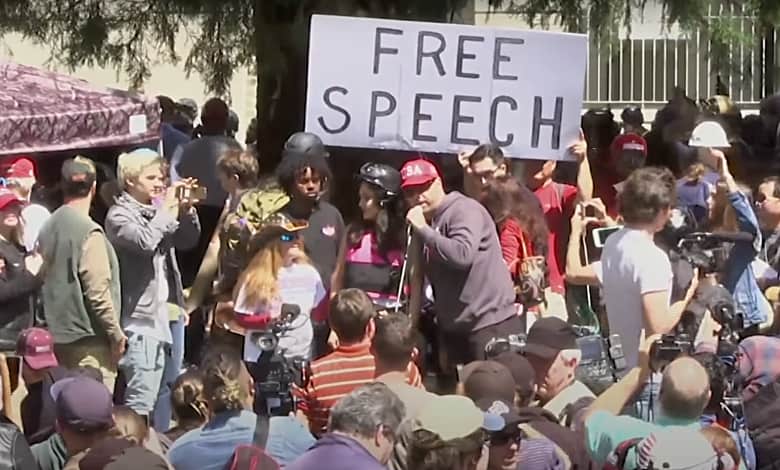Greg Lukianoff: How Diversity Can Save Free Speech (Really)
FIRE president shares secret behind pro-First Amendment group's strength

Greg Lukianoff nearly died fighting for free speech.
Lukianoff, the president of FIRE (Foundation for Individual Rights and Expression), suffered severe depression during his early days with the organization, a mental state partially brought on by his work. That led him to study cognitive behavioral therapy, which trains the mind to defang negative, exaggerated thoughts.
That helped him process what he was seeing on college campuses nationwide, a trend captured in the essential 2019 documentary “No Safe Spaces.”
“We started noticing, and it wasn’t subtle, that students were showing up on campus over-generalizing, engaging in catastrophic, binary thinking,” Lukianoff told the Hollywood in Toto Podcast. “Therefore, they were demanding more speech codes, demanding more protection, demanding trigger warnings and safe spaces.”
That inspired Lukianoff’s “The Coddling of the American Mind,” co-written by Jonathan Haidt.
The book argues that “these mental habits are a disaster for free speech and academic freedom in the long run on campus,” the author said. “They’re also a disaster for the mental health of young people.”
And, as we all know, the problem only grew worse.
His latest book, “The Canceling of the American Mind,” expands on the free speech attacks pummeling the nation. The book, co-written by Rikki Schlott, explores the roots of speech abridgment and how it led to today’s Cancel Culture scourge.
“Canceling” references the 1994 comedy “PCU” starring David Spade and Jeremy Piven. The film mocked the wave of political correctness washing over academia, but it didn’t grab the zeitgeist at the time.
Our critic’s pick: “The Canceling of the American Mind,” by Greg Lukianoff & Rikki Schlott (Simon & Schuster). @PrufrocksBurner @simonschuster @glukianoff @RIKKISCHLOTT https://t.co/pFoYyJGhu0 pic.twitter.com/SVfYsA3NWc
— The New Criterion (@newcriterion) October 11, 2023
Lukianoff, part of Gen X, thinks he knows why. The PC cultural movement “had become a joke … it was being made fun of by liberals and conservatives,” he said.
Not so fast.
“By 1995, the student population kind of fell out of love with the idea of ‘enlightened’ censorship. The faculty had kind of fallen out of love with the idea of enlightened censorship,” he said. “But what everyone missed is that the administrators kept right on chugging.”
We made a huge mistake that since things could not maintain that level of speech policing anyway, it was eventually going to fizzle out,” he said. “I started at FIRE in 2001. And already by that point, it was surprisingly easy to get in trouble for what you said on campus.”
RELATED: WHAT IS CANCEL CULTURE AND WHY ARTISTS SHOULD FEAR IT
FIRE boasted an impressive ideological diversity in its early years. Conservatives, liberals, and even Green Party members locked arms to defend free speech.
That’s true diversity of thought, unlike what’s seen in Hollywood circles where people from different backgrounds share strikingly similar views. Lukianoff says intellectual diversity helps set FIRE apart from other groups.
“One of the things that actually was a disadvantage for the ACLU is that you need actual political differences if you want to defend free speech. The person on the other side of the political fence from you will point out your blind spots, they’ll point out what you’re not getting about a case,” he said.
He witnessed just that within FIRE.
“Time and time again, you’d actually see conservatives arguing for why we should take a case that was profoundly offensive to conservatives,” he said. “It’s a beautiful thing.”
FIRE maintains that ideological diversity to this day.
“The happy hours are fun. We like to argue with each other. And it’s great,” he said.
Lukianoff shares why we’re becoming numb to free speech attacks, how comedians offer hope for a freer future and much more on the full Hollywood in Toto Podcast episode.
